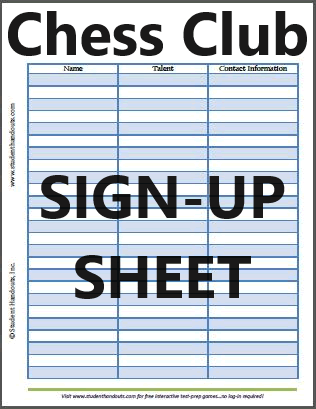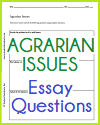| Chess Club Sign-up Sheet |
|---|
| www.studenthandouts.com ↣ Classroom Organization ↣ Sign-up Sheets |
 |
    |
|
Click here to print.
Playing chess on a high school team offers numerous benefits for students, both academically and personally. Here are several advantages of participating in a high school chess team. Critical Thinking: Chess is a game of strategy and critical thinking. Students develop their analytical skills, learn to plan ahead, and anticipate their opponent's moves. This type of thinking can be applied to academic subjects and problem-solving in general. Problem-Solving Skills: Chess involves solving complex problems on the board. Students learn to assess situations, identify challenges, and find solutions. These problem-solving skills are valuable in various academic subjects and real-life situations. Concentration and Focus: Playing chess requires intense concentration and focus. Students practice staying attentive to the game for extended periods, which can enhance their ability to concentrate on schoolwork and other tasks. Planning and Strategy: Chess teaches students to formulate plans and strategies. They must think several moves ahead and adapt their strategy based on their opponent's moves. These planning skills are transferable to academic planning and goal-setting. Memory Enhancement: Chess involves memorizing openings, patterns, and strategies. This can improve memory and recall, which can be advantageous in studying and test-taking. Sportsmanship: Chess promotes good sportsmanship and respect for opponents. Students learn to handle both wins and losses gracefully, emphasizing the importance of fair play and ethical behavior. Intellectual Challenge: Chess is intellectually stimulating and offers a continuous challenge. It provides an outlet for intellectual curiosity and a platform for competitive intellectual growth. Decision-Making: Chess requires making decisions under pressure. Students learn to make sound decisions quickly, which is valuable in time-sensitive situations both inside and outside the classroom. competitive Spirit: Chess fosters a competitive spirit in a constructive and controlled environment. Students learn how to compete effectively while respecting the rules and opponents. Academic Benefits: Chess can have a positive impact on academic performance. Research suggests that students who play chess may perform better in math, reading, and other subjects. Teamwork: While chess is an individual game, high school chess teams often compete in group settings. Students learn to collaborate, share strategies, and support their teammates. Personal Growth: Playing chess can contribute to personal growth by enhancing self-confidence, discipline, and patience. Students often gain a sense of pride and accomplishment from their chess achievements. College Opportunities: Exceptional chess players may have the opportunity to pursue college scholarships or admission to colleges with strong chess programs. Participation in high school chess can enhance a student's academic and extracurricular résumé. community Engagement: High school chess teams may participate in community service activities or organize chess tournaments and events. This engagement allows students to give back to their community and develop a sense of civic responsibility. Lifelong Enjoyment: Many students continue to play chess recreationally throughout their lives, fostering a lifelong love of the game and intellectual challenge. In summary, playing chess on a high school team offers a wide range of cognitive, personal, and academic benefits. It promotes critical thinking, problem-solving skills, concentration, and sportsmanship while providing opportunities for personal growth and competitive intellectual development. |
| www.studenthandouts.com ↣ Classroom Organization ↣ Sign-up Sheets |














































